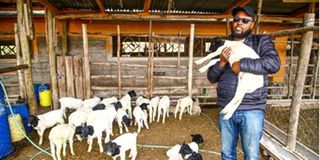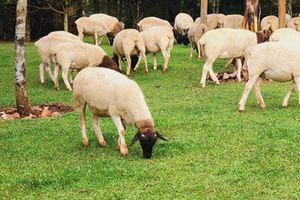
Bernard Njaramba Wagitu a Dorper farmer holds a weaner ram at his Amagoh Farm Kantafu along Kangundo Road on July 17, 2024.
At Kantafu in Machakos County, lies Mr Bernard Njaramba’s sheep farm. The jovial, charismatic, welcoming, and attentive farmer does not keep ordinary sheep.
Bernard is the founder and proprietor of Amagoh Dorper Stud, he is a guru in rearing Dorper, a hybrid sheep. The variety, sourced from South Africa and primarily kept for meat, is a crossbreed of Dorset Horn and Blackhead Persian sheep.
A visit to his farm, a few kilometers from Malaa Shopping Centre along Kangundo Road, greets one with an atmosphere dominated by the sound of bleating sheep. Nicknamed ‘the Chief Herdsman’ in the area, Bernard has mastered the art of animal husbandry. The eloquent and knowledgeable farmer is passionate about what he does.

A Dorper Sheep pictured at Amagoh Farm in Kantafu along Kangundo Road on July 19, 2024.
He admits that whenever he hears his Dorpers bleating, the sounds make him happy.
“I can tell what each baaing means. For instance, the one you hear is a cry of joy and happiness,” he told Seeds of Gold during an interview at the farm.
Amagoh Dorper Stud sits on 40 acres, where Bernard practices both free-range and zero-grazing, however, he informs us, he soon plans to convert the farm into a fully operational grazing farm, as it is primarily meant for breeding. He has already started introducing some feedlots.
Brought up in a family that kept livestock, Bernard, a father of one, established the farm in 2011.
“My first animals were cattle, but due to space shortage, I later switched to Gala goats and Dorper sheep,” he says.
He later dropped goats, and settled for the hybrid ship. The switch was driven by his love for the Dorper variety, known for its high-quality meat blended with fats.
He began with five Dorper sheep, and over time, he has grown his farm to become a notable breeder, such that in over 12 years, he has amassed over 500 Dorper sheep. “I started small, and that is what I recommend,” Bernard comments.
The pens, modernly constructed using timber, treated poles, wire mesh, concrete, and iron sheets, are subdivided to host the flock based on age and gender: lambs, ewes, and rams. Interestingly, the sheep, identified by their wide, long, black heads and white bodies with broad backs, take themselves to their “bedrooms” in the evening. They are indeed brilliant and sharp, comments the dedicated farmer.

Bernard Njaramba Wagitu a Dorper farmer at a feed storage at his Amagoh Farm Kantafu along Kangundo Road on July 17, 2024.
The improved hybrid sheep thrive in varied climatic conditions, both cold and dry (Arid and Semi-Arid Land (ASAL) regions).
Phil Rawlins, an internationally accredited Dorper sheep inspector and judge from South Africa, explains that the breed’s traits enable them to withstand harsh climate and weather conditions such as drought.
“Dorper’s feed conversion rate is quite high, with fast growth and weight gain, making it one of the most viable livestock animals for meat,” explains the expert. Additionally, Rawlins cites the ewes’ mothering ability to nurture the young ones, which can be turned into meat within 6 to 8 months under good management.
For breeding, the ewes mature in one year, and Bernard largely keeps them for multiplication.
The rams undergo a rigorous classification exercise to select the best for breeding. Those not selected for breeding are sold to farmers or for slaughter between the ages of 5 and 8 months.
Prices range from Sh45, 000 to Sh100, 000, depending on the category.
Amagoh Dorper Stud is a hub of knowledge and skills acquisition, and this year, Rawlins was the main speaker at a training event for sheep farmers from various parts of the country.
The second edition, themed, ‘Dorper Excellence: Strategies to unlock flock potential and maintain quality consistency’, was held on July 18 and 19, with a theory conference in Nairobi and practical sessions at the farm.
When asked how he has managed to grow the now thriving Dorper venture, Bernard, who also offers consultancy services on sheep management, answered, “Apart from passion for the animals, always ensure you get the correct genetics, give them the right feed, good management, knowledgeable workers, and leverage technology, and that will guarantee success.”
He has digitised his farm’s operations, adopting modern technologies and innovations such as keeping records.
The farmer, who stepped away from the corporate world to venture into Dorper farming, is keen on nutrition and formulates his own feed.
“Food rich in energy, proteins, and vital minerals such as calcium, phosphorus, zinc, and sodium are key,” says Bernard, who holds a Master’s Degree in Strategic Communication.
And to mitigate the skyrocketing cost of commercial feed and raw materials occasioned by rising taxes and levies, he grows lucerne, maize, and super napier grass.
The level of hygiene at Amagoh’s farm, including the pens and troughs, is top-notch, with a well and a borehole supplying water.
As he sets the bar higher, Bernard has a YouTube channel which he uses to raise public awareness about Dorper sheep farming. This passion extends to his Facebook and TikTok platforms, with plans to make his website and LinkedIn profiles vibrant.
At the moment, he has created employment for 10 permanent staff and 30 casual workers.







